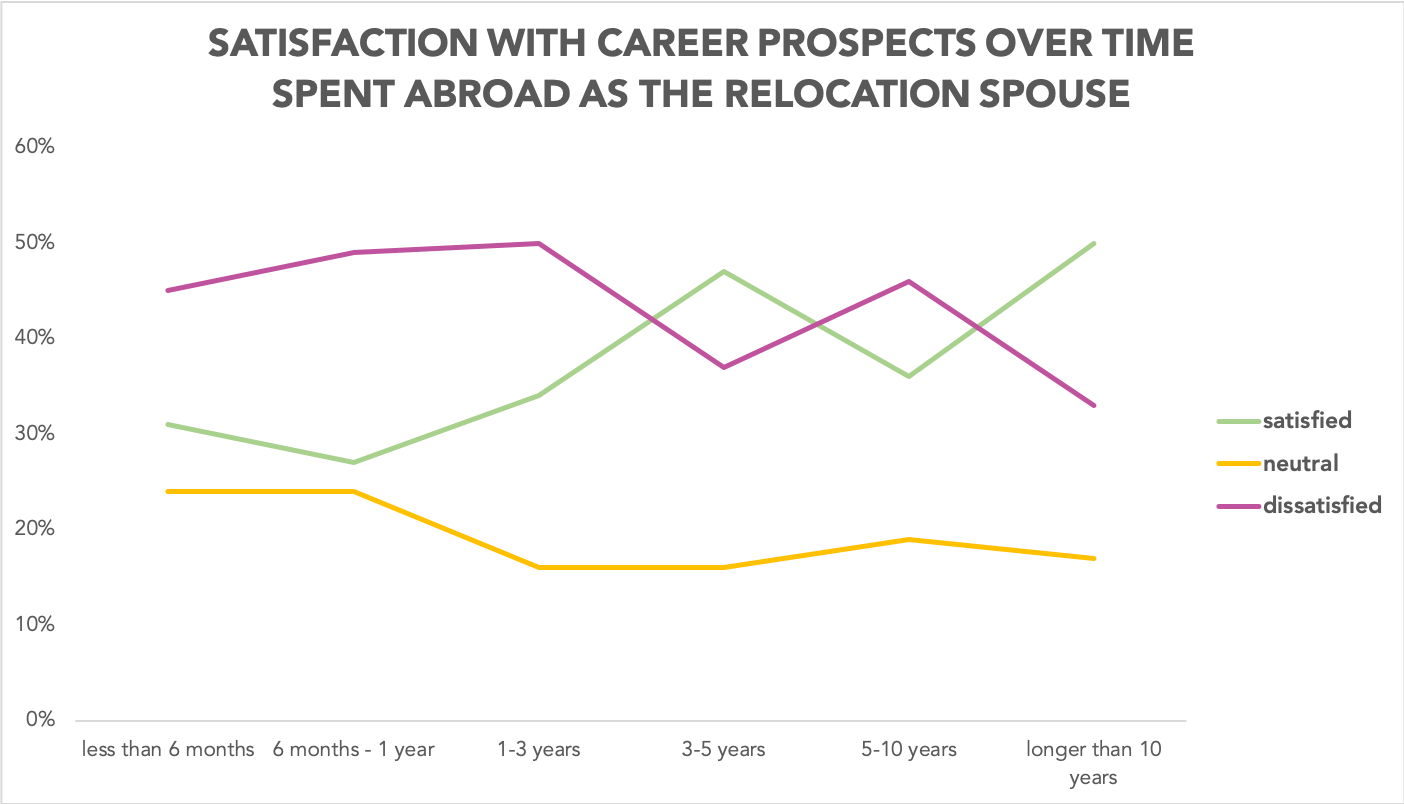
new insights about the relocating spouse
Recently, InterNations Business Solutions published its new survey about expats around the world. This time they dedicated a whole section to the relocation spouse and presented her demographics, personal situation, needs, and wishes for their time abroad.
With over 1,300 relocation spouses interviewed, it is one of the most comprehensive surveys out there. That’s why I find it highly relevant to talk about the results – so let’s have look inside.
Overall happiness factors of life abroad
What are the contributing factors to expats‘ happiness and unhappiness abroad? The survey clearly distinguishes between Foreign Assignees (respondents sent abroad by their employer), International Hires ( respondents that found a job abroad on their own), and Relocation Spouses (respondents that moved abroad for their partner’s job). Further down, I compared the Top 3 contributing factors for happiness for each expat type to show where the pain points differ. Knowing more about what makes expats happy or unhappy helps service providers within the global mobility industry to enhance their services but also helps you as an individual to know what to watch out for.
Top 3 reasons for happiness abroad
Relocation Spouses
International Hires
foreign assignees
Top 3 reasons for unhappiness abroad
Relocation Spouses
International Hires
FOREIGN ASSIGNEES
It might be an undeniable fact, that foreign assignees and international hires are most focused on their job situation while the relocating spouse is concerned about the family situation. Interestingly enough, though, all three expat types are missing social and support networks. While all three types seem to have fewer issues with settling into a foreign culture (a factor most coachings and consulting services are focused on) there is much more need on the professional front. Is it time to shift our preparation focus away from language courses, culture training, and towards connecting the employee and family to the local community? Let’s have a more in-depth look into the career situation of the relocation spouse.
Worrying about career prospects
I want to highlight one very interesting statistic in the InterNations Business Solutions Survey: They distinguished the satisfaction of the Career Prospect over time. The study even looked at the development of how satisfied relocation spouses are with that vital point of life over time.
"Career prospects have the lowest satisfaction ratings overall in the first six months, and these ratings are even lower after the honeymoon phase in the period between one and three years."

Solving the problem of professional identity and re-entering the job market abroad is a tricky thing! While doable, you will need to invest some mind space and energy to figure out the HOW and WHAT. I have dedicated a considerable portion of my work to exact that topic and can highly recommend downloading my two guides for relocation spouses if you want to get started. The first guide helps you through the early phases of moving abroad and figuring out the HOW and WHAT. The second guide deep-dives into how to futureproof our skillset and increase employability. Follow the links to find out more or contact me (info@sharethelove.blog) if you want to find out more.
With dual-career couples on the rise, there is no doubt that the career dilemma will be one of the most interesting aspects to look out for in the future. The study confirmed again, that relocating spouses are highly educated, dedicated to contributing, eager to grow and develop their professional development but also have to deal with the joy and challenge of living a happy family life abroad. The study showed that professional happiness comes in very different forms for the relocating spouse. A really high percentage decided to start their own business. Often this is supported by the beneficial financial situation of the expat agreement, and the inspirational environment life abroad can bring. Many women are triggered to try something out and realize the creation of a dream job they always longed for. Others decide for a part-time job or stick with volunteering. The bureaucratic story behind each relocating spouse is different, and the broad field of professional choices portraits this.
"From the survey results and some comments, it is clear that for Relocation Spouses not working is not only a concern but also a reason for unhappiness - 57% are not doing any paid work are wither taking care of their home and family, looking for work, or volunteering."
However, we should not ignore the fact that a career or a professional life is a vital contributor to happiness. The majority of relocating spouses still struggle to arrange themselves and not working is a definite contributor to unhappiness abroad. So what do we need to do to change these numbers? In my opinion, we have to change our approach on managing expats from a company’s perspective and change the focus to the question of: How can we empower the spouse to find her/his very own solution to the career dilemma?
Satisfaction with relocation support
How satisfied are expats with company support? Relocation support is a massive topic for Relocating Spouses, so I want to highlight some of the critical findings of the study. As someone who has shift gears to change how companies and the global mobility industry are dealing with expats this is especially crucial for me.
"Relocating Spouses do receive employer support to a certain extent, but the survey results indicate that their actual needs are not addressed."
Here re some key findings of the study
- 61% of Relocating Spouses received reimbursement for expatriation-related expenses
- Less than every second spouse is receiving spousal support from employers
- Services that are needed but often not provided: access to professional networking, access to social networking, and access to information on local life
- From the services and support received the most common feedback was "The quality was poor". This is especially relevant for the organized moved, local setting-in services, and spouse support.
If you want to know more about typical support packages and how to negotiate more for the relocating spouse, check out this article here.
An early return back home is still a scenario that happens more often than you think. There are different contributing factors from the emotional struggle to being financially dependent on the partner to loneliness and difficulties adapting to the new culture. Here are the top concerns before moving abroad and the main reasons for an early return. Again, this is a highly individual topic, but there are definitely patterns global HR consultants should take into account. Prevention can happen with the right relocation package and preparation!
Top 3 concerns before moving abroad
Main reasons for early return
Ongoing studies like the one mentioned by InterNations Business Solutions are very important to shed light on the pain points of expatriation. For us individuals, it is always interesting to see how the contributing factors are developing over time. I definitely see the issue of career development on the rise and more and more couples decide against expatriation out of fear of a career break for the partner. On the other hand, companies can address those issues way better by listening to expats and their experiences to improve their expat management. We can’t expect a different outcome when not changing the approach. So I am thankful for studies like these that give us a foundation to discuss further.
What do you think about the results? Have you had similar experiences? Let me know in the comments below or send me a direct message to info@sharethelove.blog. Let’s connect!
Thanks for sharing the love and stopping by















2 Antworten
Owing to his ancestry, my hubbie was eligable to apply for the Hungarian citizenship, so we relocated to Budapest several months ago. I’m must say I’ve really been enjoiying my expat spouse thus far 🙂
enjoying my expat spouse experience, I meant to say 😀